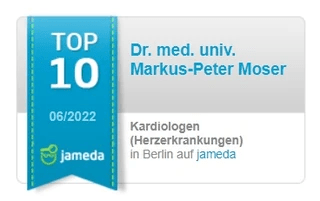Therapy

The therapy for a heart disease or after a heart intervention is crucial for the patient’s health. The holistic cardiological approach, individual psychocardiological care, appropriate follow-up for heart disease, pharmacotherapy if necessary, and changes in lifestyle habits can be elementary building blocks of therapy. In this article we will inform you about these topics in detail:
What is Psychocardiology?
How are patients psychocardiologically accompanied in Dr Moser’s cardiology practice?
How does the follow-up of heart disease work?
How does Dr Moser implement the holistic cardiological approach?
What role does Pharmacotherapy play?
What do lifestyle counselling, exercise and nutrition do for heart disease?
What is Psychocardiology?
Psychocardiology originates from the field of psychosomatics and deals with the reciprocal relationship between psychological factors and heart disease. In addition to the classic risk factors such as smoking, high blood pressure, diabetes and lipometabolic diseases, mental health in particular also plays a major role in the development of cardiovascular diseases. For example, depression is a widely studied risk factor for the development of heart attacks. Conversely, in psychosomatics, the heart or the left side of the chest is considered a projection screen for emotional conflicts.
How are patients accompanied psychocardiologically by Dr Moser in his cardiology practice?
In order to recognise connections between the mental state and cardiological diseases, one must understand the body and the soul as a unit. The mental state influences one’s own behaviour and thus physical changes that can affect the heart and possible heart diseases.
For example, high blood pressure, cardiac arrhythmias or a heart attack can be a result of both physical and psychological causes. It is therefore helpful to talk to patients about their mental state, the resulting behaviour and their habits and thus to identify possible causes of cardiological diseases in order to be able to plan and implement a suitable and individually tailored treatment.
Dr Moser has been intensively involved in psychocardiology for years and provides his patients with very targeted care. If a stay in a rehabilitation clinic with psychocardiology is necessary in the case of severe heart disease with clear accompanying psychological illnesses, Dr. Moser helps with the choice of doctor and clinic.
How does follow-up work in heart disease?
Lifestyle modification covers a multifaceted area, as it involves changing habitual routines in several areas of life. It is well known that this requires time, patience and support. If, for example, smoking cessation, weight reduction or more sports are to be implemented, then the first 3-6 months are of crucial importance. In order to meet these challenges, Dr. Moser offers a follow-up. This is characterised by individually coordinated check-up appointments to record the status quo and discuss any problems. Follow-up appointments also offer the advantage of defining goals for the upcoming meeting and planning specific projects.
The implementation of the holistic approach by Dr. Markus Moser, MD
Dr. Markus Moser, MD looks at people from different perspectives with a holistic approach to treatment. His philosophy is to grasp the disease on the one hand and the person behind it on the other, and to explore the connections between the causes of the disease together with him. He takes time for personal discussions and specific questions to jointly develop a course of action, which may include measures such as further cardiological examinations, discussions and surgical cardiological interventions.
What role does Pharmacotherapy play?
Pharmacotherapy, the therapy and treatment with medication, often plays a major role in heart diseases, such as high blood pressure. Especially in the case of severe heart diseases, drug treatment can be life-saving and therefore indispensable. However, the holistic approach is required, so that a sensibly coordinated drug therapy is not the only way, but the patient is also encouraged to change habits and behaviour with a treatment plan.
What do lifestyle counselling, exercise and nutrition do for heart disease?
In addition to a specific cardiological therapy (medication, interventions, etc.), it is important to develop a plan for an overall healthy lifestyle and to reduce existing risk factors, such as permanent stress, emotional stress factors, heavy smoking, disturbed eating behaviour, lack of exercise or excessive alcohol consumption. It is always helpful to make a sustainable contribution to personal health with the help of self-determination in the areas mentioned. In the best case, this can also reduce the extent of an existing therapy.
Targeted lifestyle and exercise programmes are therefore also a therapeutic approach in the treatment of heart disease. Regularity and structure in everyday life can change eating and exercise behaviour, promote positive energy and joie de vivre and thus also significantly influence the therapy as a whole. A diet plan for people with heart disease is often an essential part of the therapy.


